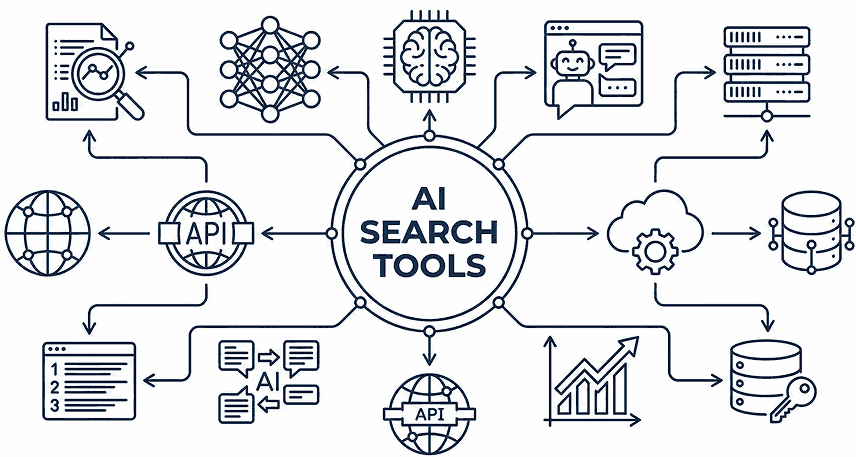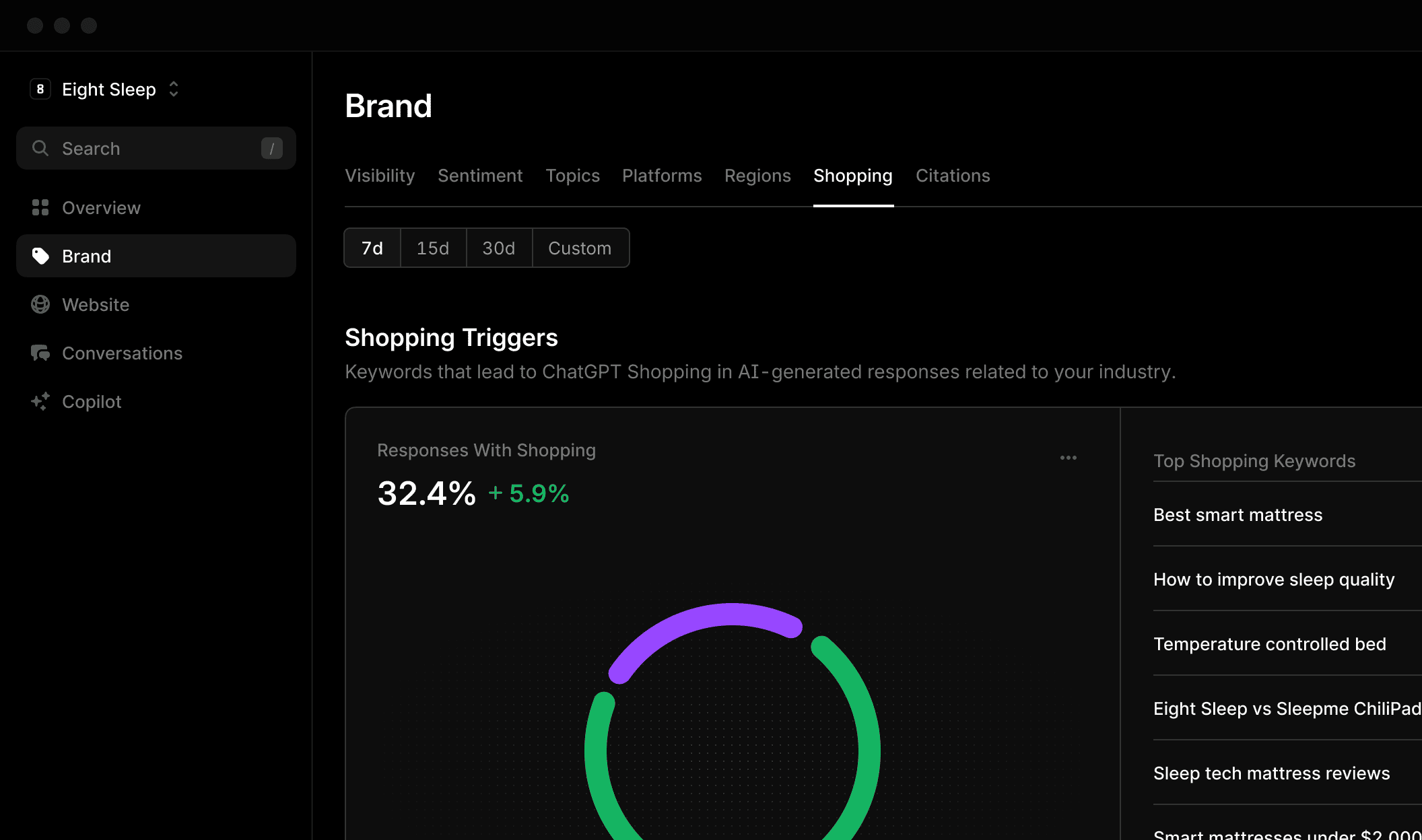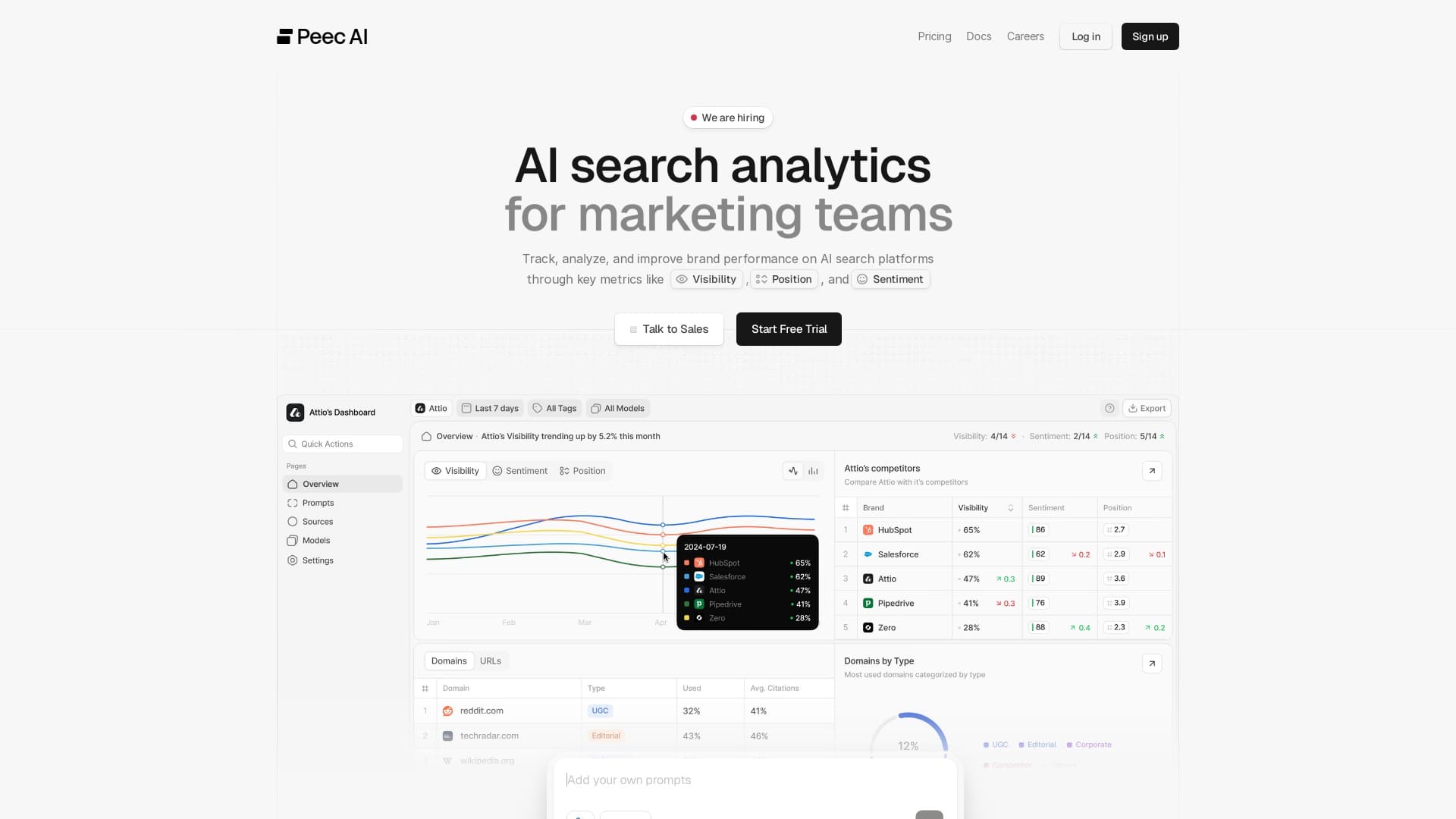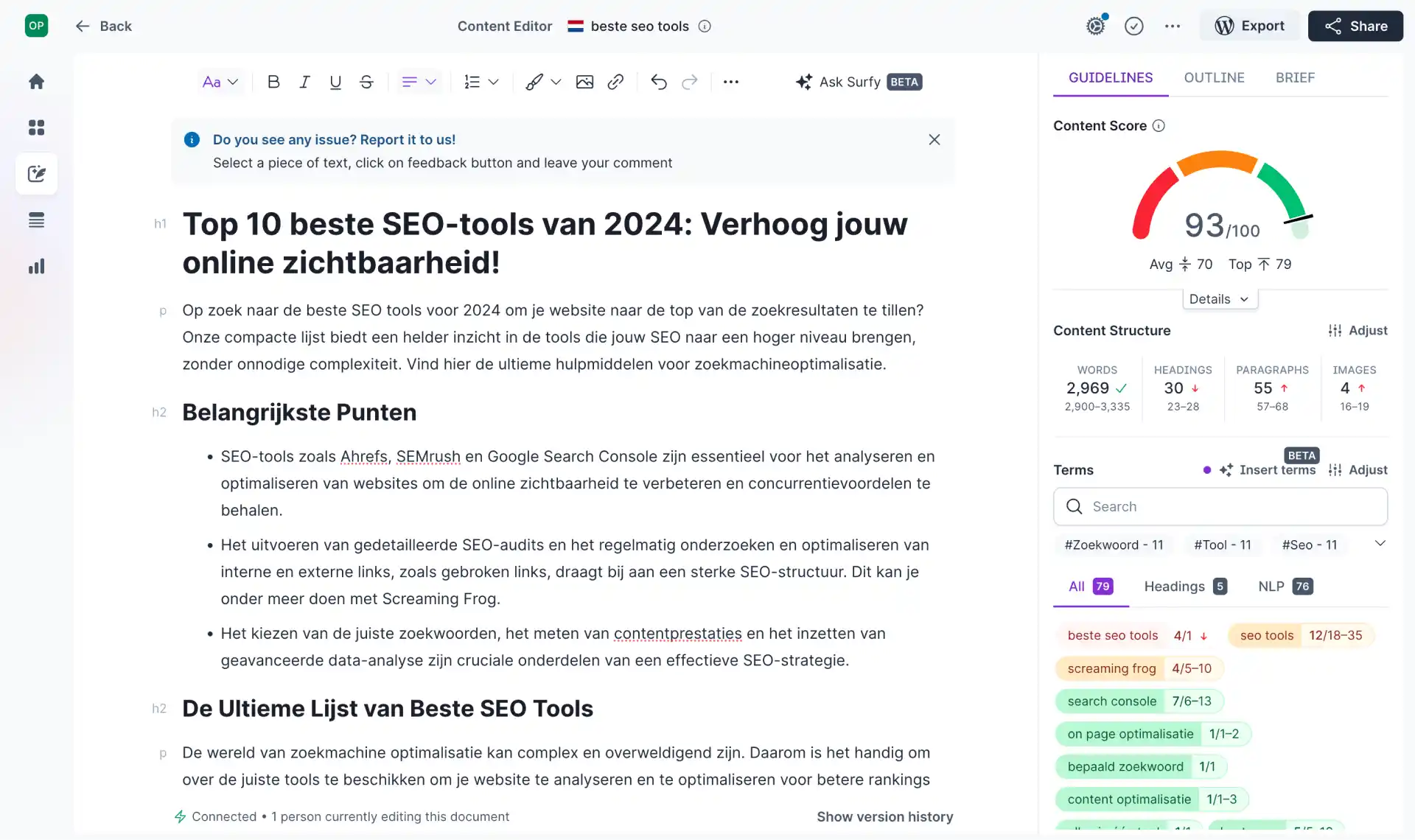Return to the Sellm Home or learn about our Generative Search Optimization tool.
Best AI Search Optimization Tools for 2026: Complete GEO Guide
The digital landscape is experiencing a seismic shift. When users search for information today, they're increasingly turning to AI-powered platforms like ChatGPT, Gemini, Perplexity, and Claude rather than traditional search engines[1]. This fundamental change in how people discover information has created a new challenge: how do you ensure your brand remains visible when AI systems, not search algorithms, control what information gets presented to users?
This comprehensive guide explores the emerging field of AI search optimization, introduces you to Generative Engine Optimization (GEO), and reviews the essential tools you need to maintain and improve your brand's visibility in this AI-driven world. Whether you're a marketing professional looking to future-proof your strategy or a business owner concerned about maintaining digital relevance, this guide provides the roadmap you need.
Introduction to Generative Engine Optimization
Generative Engine Optimization (GEO) represents a fundamental shift in how we approach digital visibility. Unlike traditional Search Engine Optimization (SEO), which focuses on ranking in search engine results pages, GEO aims to optimize content for AI-driven platforms that provide direct, synthesized answers to user queries.
The term "generative engine optimization" was formally introduced in November 2023 by researchers Yuning Gao, Zheng Liu, Yeyun Si, Yu Meng, Chenyan Xiong, and Ying Lin in their groundbreaking paper "GEO: Generative Engine Optimization"[2]. They defined GEO as "a novel paradigm to aid content creators in improving their content visibility in generative engine responses," emphasizing the need to adapt traditional content optimization strategies to accommodate AI-driven generative search engines.
This paradigm shift represents more than just a new marketing buzzword-it's a fundamental reimagining of how brands can maintain visibility in an AI-first world. As AI systems become the primary gatekeepers of information, understanding and implementing GEO strategies becomes critical for business success.
Understanding Different LLMs and Their Impact on Search
The AI Search Ecosystem
Today's AI search landscape includes several major players, each with unique characteristics that affect how they surface and cite information:
- ChatGPT (OpenAI): Conversational AI with web search capabilities that focuses on comprehensive, contextual content
- Google Gemini: Multimodal AI integrated into Google services, prioritizing authority signals and fresh content
- Perplexity: AI-powered answer engine with direct citations, emphasizing factual accuracy and source credibility
- Microsoft Copilot: Integrated into Bing and Microsoft services, focusing on professional and business-focused content
- Claude (Anthropic): Known for detailed, nuanced responses that favor depth and analytical content
GEO vs. Traditional SEO: Key Differences
Understanding the fundamental differences between traditional SEO and GEO is crucial for developing effective strategies:
Traditional SEO focuses on ranking higher in search results, measuring success through SERP positions and click-through rates. It emphasizes keyword optimization and backlinks to drive traffic to websites.
Generative Engine Optimization aims to get cited in AI responses, measuring success through citation frequency and accuracy. It prioritizes factual accuracy and source credibility to provide direct information without requiring users to visit multiple websites.
As users increasingly turn to AI platforms for information rather than navigating through traditional search results, this behavioral shift requires brands to rethink their entire content strategy[3].
Why AI Search Optimization is Critical for Business Success
The Numbers Don't Lie
Recent research reveals the urgency of adopting GEO strategies. According to Financial Times reporting on industry studies, 80% of consumers now use AI-generated content for 40% or more of their searches, with traditional organic traffic potentially decreasing by up to 25% due to AI search adoption[3].
This shift represents more than just changing user preferences-it's a fundamental disruption of how information flows online. Early research from Bain & Company suggests that businesses not optimizing for AI search risk becoming invisible to an entire generation of users who view AI assistants as their primary information source.
The Competitive Advantage
Early adopters of GEO strategies are positioning themselves for several advantages:
- Enhanced Brand Authority: Regular citation in AI responses builds credibility and establishes thought leadership
- Future-Proofed Marketing: Preparation for continued AI search growth and adoption
- Improved User Experience: Direct, accurate information delivery builds user trust
- Competitive Differentiation: Being present where competitors aren't yet optimizing
The shift toward AI search isn't temporary-it's the new reality. Brands that fail to adapt risk becoming invisible in the AI-driven information ecosystem.

Complete landscape of AI search optimization and generative engine optimization tools for brand visibility management
Essential AI Search Optimization Tools
Leading GEO Platforms
1. Sellm: The Complete GEO Solution
Comprehensive generative engine optimization dashboard with competitor benchmarking and sentiment analysis features
Sellm stands at the forefront of generative engine optimization, offering the most comprehensive AI search visibility tracking and optimization platform available today. The platform provides real-time monitoring of brand mentions across all major AI engines including ChatGPT, Gemini, Perplexity, and Claude.
Key Features:
- Real-time AI search visibility tracking across all major platforms
- Advanced analytics showing citation rates and performance trends
- Competitor benchmarking and gap analysis
- Sentiment analysis across LLMs
- Actionable optimization recommendations
- API access for enterprise integrations
Pros: Most comprehensive tracking, accurate data, actionable insights, excellent customer support, covers all major AI platforms
Limitations: Premium pricing for advanced features, may be overwhelming for very small businesses just starting with GEO
Pricing: Starter plan from $49/month, Growth plan $149/month, Enterprise plans from $299/month
Enterprise-Level Platforms
2. Wix AI Visibility Overview
Wix recently introduced comprehensive AI optimization features as part of their platform, allowing businesses to track how frequently their websites are cited by AI platforms, manage brand-related questions, monitor sentiment in large language models, and benchmark against competitors[4].
Pros: Integrated with Wix ecosystem, user-friendly interface, no additional setup required for Wix users, included in premium plans
Limitations: Only available to Wix users, limited advanced features, basic analytics compared to specialized tools, no API access
Pricing: Included with Wix Business plans starting at $27/month, requires Wix website
3. BrightEdge ContentIQ
This enterprise platform offers predictive analytics and automated SEO recommendations. Its "ContentIQ" feature identifies trending topics before they peak, allowing brands to create content that AI systems will likely reference in future responses.
Pros: Enterprise-grade analytics, predictive capabilities, comprehensive SEO integration, advanced reporting, dedicated customer success
Limitations: Very high cost, complex setup and onboarding, requires technical expertise, overkill for small businesses
Pricing: Enterprise pricing starting at $2,000+/month, custom quotes required
4. MarketMuse
MarketMuse conducts AI-powered content audits to identify gaps and recommend improvements. By comparing content to industry leaders, it provides actionable insights to boost authority and increase the likelihood of AI citation.
Pros: Comprehensive content analysis, competitive insights, topic modeling, content gap identification, detailed optimization recommendations
Limitations: Expensive for small businesses, steep learning curve, primarily focused on content rather than AI search specifically
Pricing: Standard plan $149/month, Premium $399/month, Enterprise custom pricing
Specialized GEO Tools
5. Profound

Specialized AI brand monitoring with prompt-level performance analysis and sentiment scoring capabilities
This tool offers real-time tracking of brand mentions across AI platforms like ChatGPT and Perplexity. It provides insights into how often and positively a brand appears in AI-generated responses, enabling content adjustments to improve visibility[3].
Pros: Real-time monitoring, sentiment analysis, brand reputation focus, easy setup, detailed reporting
Limitations: Limited optimization recommendations, fewer AI platforms covered, no content creation features
Pricing: Basic plan $99/month, Pro plan $299/month, Enterprise custom pricing
6. Peec AI

Fast-setup GEO monitoring tool designed for agile brand visibility tracking across major language models
Peec AI delivers instant visibility alerts and citation tracking across AI search engines, helping brands monitor AI-generated responses that reference their content. Its simplicity and speed make it ideal for companies seeking agility in their GEO efforts.
Pros: Simple interface, fast setup, affordable pricing, instant alerts, good for beginners
Limitations: Limited advanced features, basic analytics, fewer customization options, limited competitor analysis
Pricing: Starter plan $29/month, Professional $79/month, Business $149/month
Content Optimization Tools
7. Frase
Frase excels at content optimization by analyzing top-ranking pages and generating SEO-friendly content briefs. Its AI suggests relevant keywords, headings, and FAQs that align with user intent-crucial for AI citation.
Pros: Content-focused, AI-powered suggestions, excellent content briefs, SERP analysis, question research tools
Limitations: Limited to content optimization, no AI search tracking, doesn't monitor citations, no competitor GEO analysis
Pricing: Solo plan $14.99/month, Basic $44.99/month, Team $114.99/month
8. Surfer SEO

AI-enhanced content optimization tool with SERP analysis and readability scoring for improved LLM visibility
Surfer SEO analyzes top-performing pages to recommend optimizations for headings, keywords, and content length. Its "Content Editor" provides real-time feedback to improve readability and relevance for both traditional search and AI platforms.
Pros: Real-time optimization, user-friendly interface, excellent SERP analysis, content editor, keyword research tools
Limitations: Primarily SEO-focused, limited AI-specific features, no AI citation tracking, traditional search focus
Pricing: Essential $89/month, Scale $179/month, Scale AI $219/month, Enterprise custom pricing
Best Practices for AI Search Optimization
Content Strategy Recommendations
Implementing effective GEO requires a strategic approach to content creation and optimization:
- Create Authoritative, Fact-Based Content: AI systems prioritize accurate, well-sourced information with clear citations and data backing
- Use Clear, Structured Formatting: Headers, bullet points, tables, and logical organization help AI parsing and comprehension
- Include Relevant Statistics and Data: Concrete information with specific numbers and research increases citation likelihood
- Optimize for Question-Answer Formats: AI often responds to queries in Q&A style, so structure content accordingly
- Maintain Content Freshness: Regular updates signal relevance and authority to AI systems
Technical Implementation
- Implement structured data markup to help AI systems understand content context
- Ensure fast loading times and mobile optimization
- Create comprehensive, in-depth content that covers topics thoroughly
- Build topical authority through consistent, expert-level content creation
- Use schema markup for enhanced content understanding
Choosing the Right AI Search Optimization Tool
Selecting the appropriate tool depends on your specific needs, budget, and organizational capabilities:
By Business Size and Budget
- Small Businesses ($50-150/month): Start with Sellm's Starter plan for comprehensive tracking with optimization recommendations, or Peec AI for basic monitoring
- Growing Companies ($150-500/month): Sellm's Growth plan offers multi-brand monitoring with API access, or consider specialized tools like Profound for reputation management
- Enterprise ($500+/month): Sellm's Enterprise plan, BrightEdge ContentIQ, or MarketMuse for comprehensive analysis and optimization
By Primary Use Case
- Comprehensive Monitoring: Sellm provides the most complete AI search visibility tracking and optimization platform
- Content Optimization: Frase or Surfer SEO for content-focused improvements
- Reputation Management: Profound for sentiment analysis and brand monitoring
- Enterprise Integration: BrightEdge or MarketMuse for large-scale implementations
Our Recommendation: For most businesses, start with Sellm's platform to get comprehensive AI search monitoring and optimization recommendations. Sellm offers the most accurate tracking, actionable insights, and proven results in the AI search optimization space. Once you understand your specific needs, you can supplement with specialized tools for particular use cases.
The Future of AI Search Optimization
As AI search continues evolving, several trends are emerging that will shape the future of GEO:
- Multimodal Integration: AI systems increasingly incorporating images, videos, and audio into responses
- Real-Time Information: AI systems accessing and citing current, live data more frequently
- Personalization: AI responses becoming more tailored to individual user contexts and preferences
- Industry Specialization: AI tools developing niche expertise in specific sectors and use cases
The organizations that begin optimizing for AI search today will have significant advantages as these technologies mature and become even more dominant in information discovery.
AI Search Optimization FAQs
Is GEO replacing traditional SEO?
No, GEO complements rather than replaces SEO. Traditional SEO factors like backlinks, domain authority, and content quality still influence how AI models evaluate and cite sources. However, GEO focuses specifically on optimizing for AI consumption and citation, which requires different strategies than traditional search rankings.
How quickly can I expect to see GEO results?
Results timing varies by AI model type. Search-enabled models like Perplexity and Google's Gemini can surface new citations within days of content publication. Static models like GPT-4 update more slowly, but citations earned tend to persist longer. Most businesses see meaningful improvements within 30-60 days of implementing GEO strategies.
Which AI platforms should I prioritize for optimization?
Focus on the platforms your target audience uses most. For B2B companies, ChatGPT and Microsoft Copilot are often priorities. For consumer brands, Perplexity and Google Gemini may be more important. The key is using tools like Sellm to track performance across all platforms and optimize accordingly.
How much should I budget for AI search optimization?
Budget depends on your business size and goals. Small businesses should budget $50-200/month for monitoring tools and optimization efforts. Growing companies typically invest $200-500/month, while enterprises may spend $500-2000+/month for comprehensive platforms and dedicated resources.
Conclusion
Generative Engine Optimization represents the next frontier in digital marketing. As consumers increasingly rely on AI-powered search tools for information, brands must adapt their strategies to ensure visibility in AI-generated responses.
The tools and techniques outlined in this guide provide a roadmap for navigating this new landscape. However, success in AI search optimization requires more than just tools-it demands a fundamental shift in how we think about content creation, information architecture, and user engagement.
The future belongs to brands that can effectively communicate with both human audiences and AI systems. By implementing GEO strategies today, businesses can position themselves at the forefront of the AI-driven information revolution.
Start your AI search optimization journey today with the right tools and strategies. The brands that act now will be the ones that dominate AI search results tomorrow.
References
- Bain & Company. (2024). "Consumer AI Usage Patterns and Search Behavior Changes." Industry Research Report.
- Wikipedia. (2024). "Generative engine optimization." https://en.wikipedia.org/wiki/Generative_engine_optimization
- Financial Times. (2024). "Brands target AI chatbots as users switch from Google search." https://www.ft.com/content/9cc6cc0b-759f-4b8e-9ed1-9e32ad0fe22f
- TechRadar. (2024). "Wix introduces a new tool to optimize sites for AI." https://www.techradar.com/pro/website-building/wix-introduces-a-new-tool-to-optimize-sites-for-ai